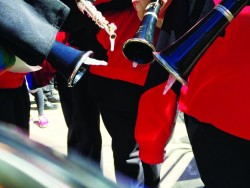 "Beware the Ides of March,” quoth the soothsayer. We all know what happened to Caesar when he ignored that warning. I didn’t really ignore that cautionary pronouncement, but was a bit cavalier when I ventured out on one of our less than springlike days just prior to the Ides of March and ended up in a thrilling battle to control a fishtailing car. Fortunately for all, the driver of a rapidly approaching vehicle chose to hit the ditch rather than hit my car. What has all of that to do with this month’s column? I began last month’s column with the plea “When will it end?” One month later, and officially into spring, it hasn’t ended. Winter is still here, but the music scene is warming up.
"Beware the Ides of March,” quoth the soothsayer. We all know what happened to Caesar when he ignored that warning. I didn’t really ignore that cautionary pronouncement, but was a bit cavalier when I ventured out on one of our less than springlike days just prior to the Ides of March and ended up in a thrilling battle to control a fishtailing car. Fortunately for all, the driver of a rapidly approaching vehicle chose to hit the ditch rather than hit my car. What has all of that to do with this month’s column? I began last month’s column with the plea “When will it end?” One month later, and officially into spring, it hasn’t ended. Winter is still here, but the music scene is warming up.
Clarinet Choir?: When I mentioned to my editor that I had the pleasure of attending a concert by the U of T Clarinet Ensemble and the Wychwood Clarinet Choir at “Clarinet Day,” he asked about the practice of using the term choir when referring to ensembles of like instruments. I embarked on a quest to determine how and when the practice evolved. Wikipedia was no help. The Oxford Companion to Music didn’t shed any light either. Nancy Nourse, whose Flute Street group uses both choir and ensemble as terms, told me that the first use of that terminology, to her knowledge, was the clarinet choir at the University of Illinois. If you have any knowledge of how this term came to be so used, please tell us; my editor would really like to know.
Plumbing Factory: As some readers may be aware, Dr. Henry Meredith’s Plumbing Factory Brass Band is one of my favourites. This is not just because it is a very good all brass band, but because “Dr. Hank,” as he is known to his friends, always comes up with very stimulating programs. Some months ago, in this column, I talked about themed programs and the pitfalls of establishing a theme and then having to select some “less than desirable” music in order to adhere to the theme. Dr. Hank’s response? “My process is to pick great music first and put it into a logical sequence for presentation. Then, the unifying concept solidifies in my imagination, suggesting additional pieces which can then fill out the program. I don’t usually start with a ‘theme’ in mind, but often major works or a mood or a general idea formulates a theme.”
For example, Mozart’s Eine Kleine Nachtmusik is the centrepiece of their upcoming April 9 concert, so “A Little Night Music” seemed a logical choice for a “theme.” Other pieces by major composers serendipitously seemed to fit right in. These include Bach’s Arioso (as a serenade melody), Mendelssohn’s Nocturne, Karl King’s A Night in June, and Meredith’s own cornet solo, Stars in a Velvety Sky.
I certainly wish that I could attend that concert, but a prior commitment and the prospect of six hours of driving to and from London dissuaded me. The first thing that I did on reading the program was to rush to my CD collection and play a recording of Karl King’s A Night in June by The Great American Main Street Band.
Medical misfortunes: In two completely disparate recent conversations I learned of two talented brass musicians who have been forced to stop playing for medical reasons. One was a case where an essential medication for a serious eye condition had a side effect of preventing the player’s producing a tone on the instrument. The obvious choice was to continue the treatment and cease playing. The other was a very different situation. The musician told me that his lips could no longer produce a tone due to a neurological condition known as focal dystonia. Dystonia refers to involuntary muscle contractions, and focal refers to the fact that the problem is localized in one part of the body. In this person’s case he is no longer able to control his lip muscles to produce a tone. In our conversation he mentioned several well-known musicians who developed this condition. One of the most notable cases is that of renowned concert pianist Leon Fleisher. In recent years Fleisher did regain some use of his right hand through botox injections, but he acknowledges that it is limited. There is no such treatment for brass players. I can’t imagine how someone could cope with the news that they could no longer continue their musical career. In this person’s case, he is now considering the clarinet as his instrument.
On the April horizon: First on my calendar is a return of the Band of HMCS York on April 9 at 8pm to the Naval Club of Toronto. This is the fourth year in a row where the multi-talented members of the HMCS York band will showcase their various small ensembles. I can’t promise novelties like last year’s duet for alto trombone and harpsichord or another didgeridoo solo. However, I can guarantee a stimulating evening of music. The location is 1910 Gerrard St. E. and the price is right. Admission is free and light refreshments will be served.
On the weekend of April 11 to 13 The Hannaford Street Silver Band will present their annual “Festival of Brass.” At time of writing I had no details of this event, but a visit to their website should help.
The Clarington Concert Band will present their Spring Concert on April 26, 7pm at Trinity Pentecostal Church in Bowmanville. Also, on Sunday, May 4 at 2pm the Markham Concert Band and the Pickering Community Concert Band will join forces to present “The Final Frontier,” a musical interpretation of space featuring guest performer bagpiper Ian MacLellan. They don’t say whether or not they consider the bagpipes as the last frontier of music. It all takes place at the Flato Markham Theatre.
Blythwood Winds is a group I hadn’t heard of. It is a traditional wind quintet which had its roots about four years ago with students at the Glenn Gould School, although only two of the original members remain. Sunday, April 13 at 7pm they will be at the Array Space, 155 Walnut Avenue offering a broad selection from Leonard Bernstein’s Candide Overture arranged by their horn player Curtis Vander Hayden to a new work Extensions by local composer, Elisha Denburg. Personally, I hope to be there to hear one of my favourites: Darius Milhaud’s La cheminée du roi René. For advance reservations phone 416-999-6097.
Last year the group of New Horizons bands in Toronto spread their wings and formed a number of small ensembles. The finale of that initiative was an afternoon of short presentations by several of these ensembles. Another such afternoon of “Chamber Sweets” will be held in the Assembly Hall at Lakeshore Road and Kipling Avenue on Sunday, April 27 at 2:00 pm, with about 15 groups playing from the jazz and classics repertoire.
Finally, down the road we have two large scale events to announce now with details to follow: the annual York University Community Band Festival will take place Saturday May 3 from 1:00 to 9:00 pm; and from May 30 to June 1 the Canadian Band Association, Ontario Chapter (CBAO) will host the Ontario EAST Community Band Weekend in Ottawa.
Definition Department
This month’s lesser known musical term is: Cadenza: Something that happens when you forget what the composer wrote. We invite submissions from readers. Let’s hear your daffynitions.
Jack MacQuarrie plays several brass instruments and has performed in many community ensembles. He can be contacted at bandstand@thewholenote.com.



